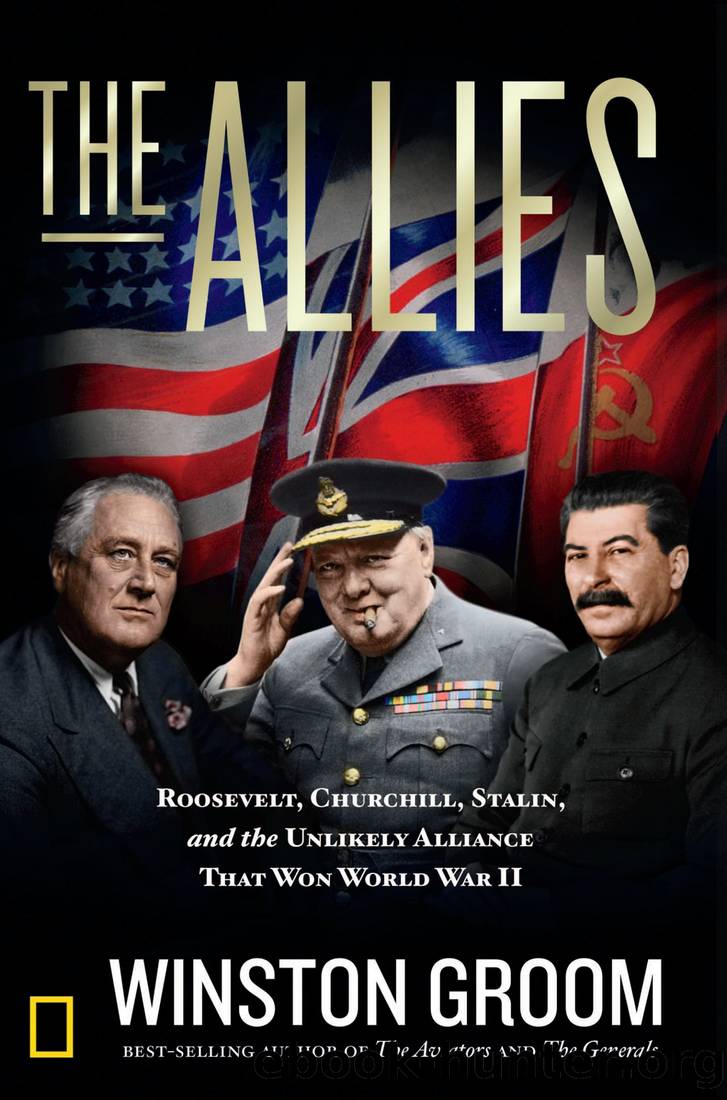Groom, Winston - The Allies by Groom Winston

Author:Groom, Winston [Groom, Winston]
Language: eng
Format: epub
Publisher: National Geographic Society
Published: 2018-11-13T00:00:00+00:00
Across the sea, corpses in the waters
Across the mountains, corpses in the fields
I shall die only for the Emperor
I shall never look back.21
In Washington, Roosevelt was having lunch at the White House with his troubleshooter Harry Hopkins when word came from Navy Secretary Frank Knox that a message was just received: “Air raid Pearl Harbor. This is not a drill.”22
The president knew from the state of negotiations that the Japanese would probably start a war, but not where or when. This news, he told Hopkins, proved that the Japanese had been planning the attack the entire time they said they were “negotiating in good faith.” More information began to come in describing the damages; it was even worse than originally thought. Roosevelt didn’t learn the whole story for several weeks. He was particularly irate about U.S. planes being caught on the ground.
Anger at the Japanese was palpable, but that toward the Army and Navy commanders at Pearl Harbor vied for a close second; they were immediately relieved of command and vilified throughout the land. But there was much more to the story than that. After vigorous investigations that lasted years, both commanders were shown to have been far less guilty of unpreparedness than was originally thought.
Roosevelt also soon came under suspicion, after the isolationist senator Gerald P. Nye told an audience on the evening of the attack, “The president has maneuvered us into this war.” Generations of historians, critics, and cranks have amplified that statement—some going so far as to charge that Roosevelt actually knew the time and place of the attack but had withheld it in order to bring America into the war.
This last charge is ridiculous. Roosevelt was in fact looking for a reason to get the United States into the war but, as a former secretary of the Navy, the notion that he would allow all those sailors to be killed and ships to be sunk is too monstrous to contemplate. Besides, if he had known about the attack, why wouldn’t he have warned Navy commanders so they could have ambushed the Japanese as they prepared to bomb Pearl Harbor and sunk their ships, and shot down their planes, and killed their sailors? That would certainly have been a far smarter choice for the president than seeing his Pacific Fleet at the bottom of the ocean.
“We are all in the same boat,” Roosevelt told Winston Churchill, who could barely contain himself on the evening following the attack. Churchill had called the president from Chequers, the traditional country home of the British prime minister, at the close of a weekend in Kent. In a telegram next day, just to follow up, Roosevelt added, “And it is a ship which cannot and will not be sunk.” Afterward Churchill wrote: “I knew then that the war was won.”23
*1 Interestingly, this would have included, at the suggestion of U.S. Army Chief of Staff Douglas MacArthur, whose antipathy toward airplanes was well known, a ban on all warplanes and aircraft carriers.
Download
This site does not store any files on its server. We only index and link to content provided by other sites. Please contact the content providers to delete copyright contents if any and email us, we'll remove relevant links or contents immediately.
| Afghan & Iraq Wars | American Civil War |
| American Revolution | Vietnam War |
| World War I | World War II |
Waking Up in Heaven: A True Story of Brokenness, Heaven, and Life Again by McVea Crystal & Tresniowski Alex(37002)
Empire of the Sikhs by Patwant Singh(22170)
We're Going to Need More Wine by Gabrielle Union(18072)
Hans Sturm: A Soldier's Odyssey on the Eastern Front by Gordon Williamson(16610)
Leonardo da Vinci by Walter Isaacson(11901)
The Radium Girls by Kate Moore(10906)
Educated by Tara Westover(7061)
Tools of Titans by Timothy Ferriss(6944)
How to Be a Bawse: A Guide to Conquering Life by Lilly Singh(6692)
The Last Black Unicorn by Tiffany Haddish(5073)
Permanent Record by Edward Snowden(4996)
The Rise and Fall of Senator Joe McCarthy by James Cross Giblin(4842)
Promise Me, Dad by Joe Biden(4444)
The Wind in My Hair by Masih Alinejad(4424)
The Crown by Robert Lacey(4104)
A Higher Loyalty: Truth, Lies, and Leadership by James Comey(4031)
The Iron Duke by The Iron Duke(3639)
Joan of Arc by Mary Gordon(3256)
How to be Champion: My Autobiography by Sarah Millican(3185)
